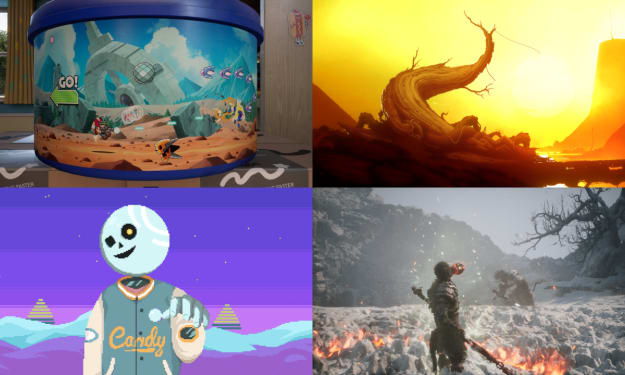The Ethics of Save Files
An ode to an age when you could rent a stranger's free time.

A seldom remarked upon quirk of video games in the 90's was that if you rented a game, you might also find yourself in possession of a fragment of someone else's free time in the form of a save file. This might represent a hour of that person's time or fifty, played across a single evening or piecemeal over weeks. But for the duration of the rental, you had absolute control over this frozen span of time, with the power to use, abuse, or dispose of it as you wished - all while knowing that soon, another person would have the same control over your time.
As a child, I had an obsession of sorts with save files, if only from a practical standpoint. As someone who enjoyed the kind of titles that take dozens of hours to finish, I was concerned that - if I didn't get to the store fast enough the following Friday - some stranger might casually annihilate a lot of effort. But just as well, I was concerned that I might accidentally do the same thing to someone else. This led me to devise two sets of rules - one an ethical code for handling the data of others, one a practical guide for safeguarding my own.
I might have taken these things a little bit too seriously.
It's only now - many years later, long after time and tide rendered these rulesets moot - that I realize how strange the entire thing was. Not those sets of rules (though that's part of it), but the entire setup by which a large group of strangers, mediated by a business, blindly exchanged data representing a significant portion of their free time. There was a time when, out of necessity, I trusted people I never met more than some of my closest friends, and somehow it worked out - usually.
Other People's Experiences
A save game was a treasure trove of information. One with an eye for detail could learn a lot about a game he'd never played or even heard of by studying what someone else had done. You could take a reasonable guess at the length of a title, see characters and items to come, and sometimes even catch some hints to the story. The saves as a group might teach you something as well. Did a lot of people reach the same point? Perhaps that's where the difficulty spikes. Is there one file with hundreds of hours of playtime, while the others have very little? Either the title is heavy in bonus content, or (if it's an older cartridge) you're looking at a communal file, enjoyed by many over the years.
Playing someone else's game was one of the items on my list of ethical rules. True, it's not as bad as deleting it, but doesn't it still ruin the experience for someone if a stranger kicks off several story events? Maybe it's okay to play that file if it's very old and you can reasonably guess that the person who created it isn't coming back, but you couldn't tell that on older systems. So what to do? I reasoned that it was fine to play that file - just to get a glimpse of someone else's experiences - but not to save it, unless there is an open slot into which I could copy the file.
I was probably the only person batty enough to bother codifying rules like this - yet there must have been rules, unspoken rules between strangers that all of us understood even if none of us actually agreed to them. How else can I explain how I managed to finish so many of these games, or how rarely my own saves were despoiled?
A Friend I Never Met
I've been using the word "strangers" throughout this piece, but in my case that might not be so accurate. I come from a small town - only about 6,000 people - and for most of the period I'm describing, there were at most two places to rent games. In a lifetime, each cartridge would pass through dozens of hands, if not hundreds for the more popular ones. It's more than possible that I knew of the people who were renting these games and making these save files, or had even met them.
Did I have some sort of relationship with these other renters? It's likely that all we had in common was that we all owned a SNES and enjoyed video games that were too long to be finished in one weekend. Still, there was this weird connection I had with this circle of mystery gamers. Without being able to pick any of them out of a crowd, I was competing with them, sharing experiences with them, putting trust in them and taking their trust in turn.
It's possible that some of them were leaving clues in their saves, little unconscious hints in the names of characters and files. Teenagers are often not the most subtle at naming characters, laying their own handles on the protagonists and branding others with the names of friends or girls they were interested in. Perhaps, instead, someone uses an in-joke as a name - an obscure pop culture reference or a secret personal nickname. It doesn't tell me who this person is, but tracking that in-joke across titles could let me glean information about his taste in electronic entertainment.
But this was one thing I never did. For all the nosing around I did as a kid, and for all the concern I put into preserving the data of others, I never cared all that much about the creators of that data. Even then, it never occurred to me that these were, in a sense, my people.
All Down to Trust
I never made any written record of my rules - there wasn't any need to write them down, not when I used them every week of my life. Yet even as the years rolled on, as the rise of optical media and external memory storage made those rules obsolete, I still remembered them. If I wake up tomorrow in the year 1994, I'll still know exactly how to handle that new copy of Final Fantasy III.
Really, the rules aren't that hard, and are probably just common sense or common decency to most people: Never delete a save file unless you have to. Always delete the one that's made the least progress. Save your own files into multiple slots before returning the game, then delete the unneeded ones when you're totally finished. Avoid saving in the first slot if possible - some people automatically delete that one without thinking. Oh, and don't save on another person's file unless you're sure they're done. Not a taxing set of guidelines to remember, and by and large very intuitive.
Intuitive or not, it's amazing how well this worked out. After all, these were people who didn't know me. They were taking possession of something that was not their property - already a license to mistreat it, for many people - and then further taking over an intangible asset within that borrowed property. How did I not lose more progress? Are informal rules really this effective, or was I simply lucky?
There was one time that I was wiped out, but it involved someone I really had met. I loaned a copy of Banjo-Kazooie to a friend so that one of his younger relations could play it. I had a single save file on the game at 100% completion, uncopied in the first slot - a breach of the own rules, but why observe those rules on my own property? When the cartridge was returned to me, I discovered that whomever had played it had needlessly deleted the first save, the one I'd worked so hard on.
I was, of course, furious that someone had carelessly eradicated something that I'd worked on for weeks. But maybe the real aggravation was not the loss of the save file itself, but the way that this kid - someone I knew, someone I had reason to trust - had broken the rules. Over the years, I'd entrusted hundreds, if not thousands of hours of my time to the nameless masses and they treated it with care. The one time I gave my time to someone with a name, he threw it away.
I wish I could say that I learned something deep about human nature from this. Mostly, I learned to always make copies.
About the Creator
Andrew Johnston
Educator, writer and documentarian based out of central China. Catch the full story at www.findthefabulist.com.






Comments
There are no comments for this story
Be the first to respond and start the conversation.